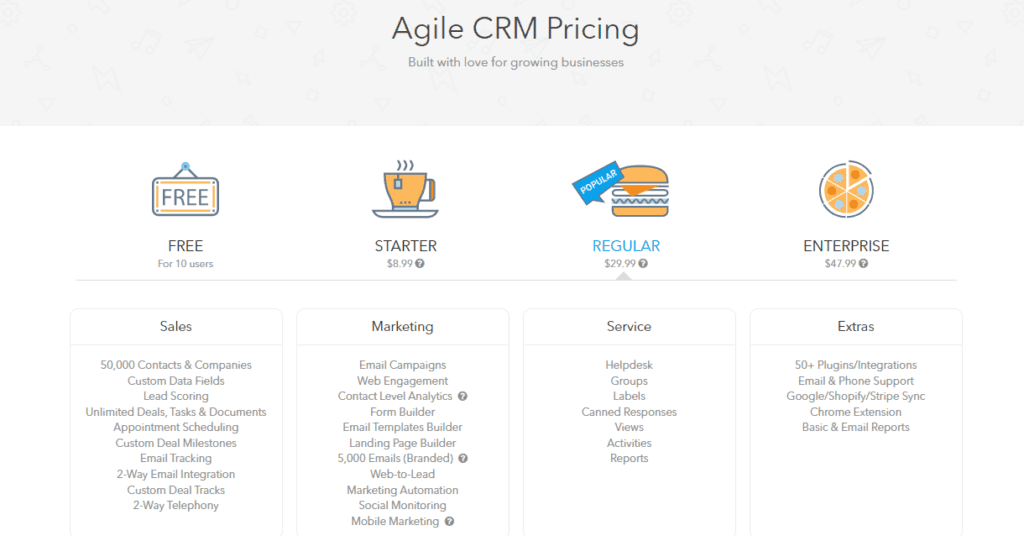Agile CRM is a customer relationship management software that delivers on its name. Built with a deep focus on providing its users with agility and speed in conducting CRM and workflow automation operations, it seems like a pretty good CRM choice for individuals and startups with a team size of less than 20 and who do not want to go through a steep learning curve.
While it is an entry-level CRM, it offers a freemium plan that has an extremely well placed pricing structure, it seems to be encountering some difficulty in 2023. While Agile CRM is a great customer relationship management software and I would recommend Agile CRM to entrepreneurs and small scale startups who are looking for a CRM software to start with, I would advise you to be a little more cautious because of some these issues that I shall discuss in a section down below.
Features of Agile CRM Software
With a wide range of features, Agile CRM streamlines and automates sales, marketing, and customer support processes, allowing businesses to manage their customer relationships effectively.
A. Contact Management
#1. Centralized contact database
Agile CRM offers a centralized contact database that allows users to store and manage all their customer information in one place. This database provides a comprehensive view of each customer, including their contact information, interactions with the company, purchase history, and more. By centralizing customer data, businesses can easily access and analyze this information to make better decisions and tailor their strategies to individual customer needs.
#2. Contact segmentation and filtering
Agile CRM’s contact management features include advanced segmentation and filtering capabilities. Users can segment their contacts based on various criteria, such as demographics, behavior, or engagement levels. This allows businesses to create targeted marketing campaigns and improve their sales efforts by focusing on the most relevant and valuable customers. Furthermore, Agile CRM’s filtering options make it easy to find specific contacts or groups of contacts quickly.
B. Deal Tracking
#1. Customizable deal stages
Agile CRM’s deal tracking features enable businesses to manage their sales processes efficiently. Users can create customizable deal stages that align with their unique sales processes, allowing them to track deals as they move through the pipeline. This customization ensures that the platform is tailored to the specific needs of each business, improving the overall effectiveness of their sales efforts.
#2. Visual sales pipeline
Agile CRM provides a visual sales pipeline that allows users to track deals and monitor their progress at a glance. The pipeline view displays deals in their respective stages, making it easy to identify bottlenecks and prioritize leads. With the ability to drag-and-drop deals between stages, businesses can quickly update their pipeline and maintain an accurate representation of their current sales activities.
C. Marketing Automation
#1. Email campaign management
Agile CRM includes a robust email campaign management feature that allows businesses to create and execute targeted email marketing campaigns. Users can design professional-looking emails using pre-built templates or by creating custom designs. With the platform’s advanced automation capabilities, businesses can schedule and send personalized emails to specific segments of their audience, improving engagement and conversion rates.
#2. Multi-channel marketing capabilities
In addition to email marketing, Agile CRM offers multi-channel marketing capabilities that allow businesses to reach their audience through various channels, such as social media, SMS, and web forms. This ensures that businesses can engage with their customers across multiple touchpoints, increasing the chances of conversion and fostering stronger relationships.
D. Customer Support
Agile CRM features a built-in helpdesk that enables businesses to manage customer queries and support tickets efficiently. The helpdesk allows users to assign, prioritize, and track support tickets, ensuring that customer issues are resolved promptly. By centralizing customer support activities within the CRM platform, businesses can maintain a comprehensive view of their customer interactions and improve their overall customer experience.
However some users are complaining that customer support resolutions have not been good enough for their requirements during 2022. Since, customer support is a very important part of keeping customer trust for any startup, I believe the problem has been sorted out and since I have not raised any customer support complaints for my review, I would not be able to comment on the same! Sorry!
E. Agile CRM offers great beginner-friendly Reporting and Analytics
Agile CRM provides robust reporting and analytics features that enable businesses to track and measure the success of their sales, marketing, and customer support efforts. These insights help businesses make data-driven decisions and optimize their strategies for better results.
#1. Custom reports
Agile CRM allows users to create custom reports tailored to their specific needs. With an intuitive report builder, businesses can easily design and generate reports using various data points, such as deal value, lead source, or campaign performance. These custom reports can be shared with team members or exported to various formats for further analysis.
#2. Sales and marketing performance tracking
Agile CRM offers comprehensive sales and marketing performance tracking features that enable businesses to monitor their efforts and identify areas for improvement. Some key performance indicators (KPIs) that can be tracked within Agile CRM include:
- Lead conversion rates
- Average deal value
- Email open and click-through rates
- Web form submission rates
- Customer satisfaction scores
By closely monitoring these KPIs, businesses can identify trends, pinpoint areas of weakness, and adjust their strategies to enhance overall performance.
#3. Cohort analysis
Cohort analysis is a powerful analytics feature in Agile CRM that allows businesses to analyze the behavior of specific groups of customers over time. This helps businesses understand the effectiveness of their marketing efforts and identify patterns in customer behavior. For example, a business could use cohort analysis to track the lifetime value of customers acquired through a particular marketing campaign or the retention rate of customers who made their first purchase during a specific time period.
#4. Real-time analytics
Agile CRM provides real-time analytics that enable businesses to monitor their performance as it happens. This helps businesses respond quickly to changes and make adjustments as needed. Real-time analytics can be particularly useful for tracking the performance of time-sensitive campaigns or monitoring the progress of ongoing sales deals.
F. Integrations in Agile CRM
Agile CRM offers seamless integration capabilities with a wide range of third-party applications. These integrations allow businesses to connect their existing tools and streamline their workflows, improving overall efficiency.
#1. Third-party application compatibility
Agile CRM supports integration with numerous third-party applications, including popular tools like:
- Email platforms (Gmail, Outlook, Office 365)
- Calendar services (Google Calendar, Office 365 Calendar)
- Communication tools (Slack, Skype)
- File storage services (Google Drive, Dropbox, OneDrive)
- Marketing tools (Mailchimp, ActiveCampaign, Constant Contact)
- Social media platforms (Facebook, Twitter, LinkedIn).
- Agile CRM can be integrated with popular live chat tools, such as Zendesk Chat, Intercom, and LiveChat. This allows businesses to offer real-time support to their customers and respond to their queries instantly. By integrating live chat with Agile CRM, businesses can track and store chat transcripts, providing valuable insights into customer issues and preferences.
#2. Popular integrations
Some popular integrations that can enhance Agile CRM’s functionality include:
- Zapier: Zapier allows businesses to connect Agile CRM with thousands of other applications, automating tasks and workflows between various tools. For example, a business could use Zapier to automatically create a new contact in Agile CRM when a new subscriber is added to their Mailchimp list.
- Twilio: Twilio integration enables businesses to send SMS messages directly from Agile CRM, allowing for personalized, targeted communication with customers. This can be particularly useful for appointment reminders, order updates, or promotional campaigns.
- Stripe: Integrating Agile CRM with Stripe allows businesses to manage and track payments and subscriptions within the CRM platform.
G. User-friendly Interface
Agile CRM features an intuitive and user-friendly interface, making it easy for users to navigate and operate the platform. This helps reduce the learning curve and ensures that teams can start using the platform effectively in no time.
Some other CRM platforms may have more complex interfaces, requiring a steeper learning curve and potentially causing delays in adoption and efficiency. The user-friendly design of Agile CRM can be a significant advantage for businesses looking for a CRM platform that is easy to learn and use.
Agile CRM Ratings by Independent Reviewers
Here are some ratings from popular review platforms as of March 2023:
- G2: Agile CRM had a rating of 4.0 out of 5 stars based on over 319 user reviews.
- Capterra: Agile CRM scored 4.1 out of 5 stars based on over 472 user reviews.
- GetApp: Agile CRM received a rating of 4.1 out of 5 stars based on over 472 user reviews.
- TrustRadius: Agile CRM had a rating of 6.5 out of 10 based on 134 user reviews.
While Agile CRM had an even higher rating in September 2021, it seems that they have run into several software and technical glitches throughout the whole of 2022. Most users experienced issues with customer support and reported several software bugs, which are present in the paid versions as well. However, during my limited testing time, I did not find any software bugs.
Pros and Cons of Agile CRM
Pros of Agile CRM
- All-in-One Solution
Agile CRM is a comprehensive, all-in-one solution that combines sales, marketing, and customer service features in a single platform. This unified approach allows businesses to manage and track customer interactions, marketing campaigns, and sales pipelines without the need for multiple applications. Agile CRM’s integration of various functions can help organizations save time, resources, and ultimately, money.
- Customizable and Scalable
One of the key strengths of Agile CRM is its customizability and scalability. The platform offers a range of features that can be tailored to the specific needs of businesses, regardless of their size or industry. This flexibility allows organizations to scale their CRM as they grow, ensuring that they always have access to the tools and functionalities they need to succeed.
- Affordable Pricing
Compared to many of its competitors, Agile CRM offers an affordable and competitive pricing structure. The platform offers a free plan with basic features, as well as paid plans that provide access to more advanced functionalities. This pricing flexibility enables businesses of all sizes to adopt Agile CRM without breaking the bank.
- User-Friendly Interface
Agile CRM is known for its intuitive and user-friendly interface, which simplifies the learning curve for new users. This ease of use makes it possible for teams to quickly adopt the software and start leveraging its features to improve their business processes.
- Automation Capabilities
Agile CRM offers a wide range of automation features, including email marketing automation, lead scoring, and appointment scheduling. These tools can help businesses save time, increase efficiency, and maintain consistency in their customer interactions.
- Third-Party Integrations
Agile CRM supports a variety of third-party integrations, allowing businesses to connect the platform to other software solutions they may be using. These integrations make it easier for teams to share data and collaborate more effectively, leading to improved productivity.
Cons of Agile CRM
- Limited Features in the Free Plan
While Agile CRM offers a free plan, it comes with limitations in terms of features and the number of users allowed. This may not be an issue for smaller businesses or those just starting, but growing companies may need to upgrade to a paid plan to access the full range of functionalities.
- Customer Support
Some users have reported issues with Agile CRM’s customer support, stating that responses can be slow or unhelpful. This may be a concern for businesses that require prompt and effective support, especially if they encounter critical issues.
- Steeper Learning Curve for Advanced Features
Despite its user-friendly interface, Agile CRM’s advanced features may come with a steeper learning curve for some users. This can be particularly true for those who are new to CRM systems or are not tech-savvy. However, Agile CRM offers a range of resources, including video tutorials, webinars, and a knowledge base, to help users get up to speed and I believe it is one of the easiest CRMs for users to start out with.
- Limited Customization Options for Reporting
While Agile CRM offers a variety of reporting and analytics features, some users have found the customization options to be limited. This can be a drawback for businesses that require more in-depth or specific reporting capabilities.
Agile CRM Pricing: A Flexible Approach
Agile CRM offers four pricing tiers, each catering to different business sizes and requirements. These plans include Free, Starter, Regular, and Enterprise. Let’s explore each of these plans in detail.

#1. Free Plan
Designed for startups and small businesses, the Free Plan provides basic CRM features for up to 10 users. Key features include:
- Contact management
- Lead scoring
- Custom data fields
- Task management
- Email campaigns (up to 2,000 emails/month)
- Unlimited deals, documents, and appointments
#2. Starter Plan
The Starter Plan, is perfect for small businesses looking to unlock advanced CRM capabilities. This plan allows for unlimited users and provides:
- All features of the Free Plan
- Email campaigns (up to 5,000 emails/month)
- Marketing automation
- Landing pages
- Social media monitoring
- Email and phone support
#3. Regular Plan
The Regular Plan is suitable for growing businesses that need advanced sales and marketing automation features. This plan includes:
- All features of the Starter Plan
- Email campaigns (up to 25,000 emails/month)
- Sales and marketing automation
- Advanced reporting and analytics
- 2-way email integration
- Custom deal tracks and milestones
- Web engagement tracking
#4. Enterprise Plan
The Enterprise Plan is designed for large enterprises that require a comprehensive CRM solution. The plan features:
- All features of the Regular Plan
- Email campaigns (up to 50,000 emails/month)
- Dedicated account manager
- IP whitelisting
- Custom onboarding and training
- Premium support
Agile CRM’s flexible pricing and plans make it an attractive solution for businesses of all sizes. Whether you’re a startup, small business, or large enterprise, Agile CRM has a plan tailored to your needs. Keep in mind that Agile CRM also offers a 14-day free trial, allowing you to test out the platform before making a commitment.
So, Should You Use Agile CRM?
In the competitive CRM landscape, it can be challenging to determine which solution is the best fit for your business. That”s why these are some special CRM considerations that Agile CRM is a very good fit for. If you think, you need the following requirements, then go ahead and try out Agile CRM for your business!
Agile CRM offers Ease of Use and Customization
Agile CRM is known for its user-friendly interface and intuitive design, making it easy for users to navigate and manage tasks. The platform also offers extensive customization options, including custom data fields, deal tracks, and milestones. This flexibility allows businesses to tailor the CRM to their unique processes and workflows, enabling seamless adoption and increased productivity.
Affordability and Scalability
Compared to other CRM solutions, Agile CRM offers competitive pricing with its tiered plans that cater to different business sizes and requirements. From the Free Plan for startups and small businesses to the feature-rich Enterprise Plan, Agile CRM provides an affordable CRM solution without compromising on functionality.
Additionally, Agile CRM’s scalability allows businesses to upgrade or downgrade their plans as they grow or as their needs change. This flexibility ensures that organizations only pay for the features they need, keeping costs in check.
Agile CRM doubles down on Marketing Automation
Agile CRM stands out with its robust marketing automation capabilities, which are available even in the Starter Plan. This feature allows businesses to create and manage email campaigns, design landing pages, and track web engagement. Additionally, Agile CRM’s social media monitoring tools help businesses keep a pulse on their customers and leads, further enhancing marketing efforts.
Feature-Rich All-in-One Solution
One of the key differentiators of Agile CRM is its all-in-one approach. While many CRM platforms focus on specific aspects of customer relationship management, Agile CRM combines sales, marketing, and customer service functionalities in a single platform. This integration results in streamlined operations, improved collaboration, and reduced data silos, making it a comprehensive solution for businesses of all sizes.
Wrapping it Up
In comparison to other CRM solutions, Agile CRM offers a unique combination of an all-in-one platform, ease of use, customization, affordability, and marketing automation. While it may not be the ideal choice for every business, its versatility and feature set make it a strong contender for those seeking a comprehensive CRM solution. If you’re evaluating CRM platforms, Agile CRM’s 14-day free trial can provide valuable insights to help you make an informed decision.
Read Next:
- How to Create Buyer Personas for Your Business? (6 Step Process)
- Competitor Research Made Simple (and Dangerous!)
- 13 Best ERP Software in 2023
- HubSpot vs Zoho CRM: What’s the Better CRM?
- Why You Should Use Python for Your Business Analytics?





















